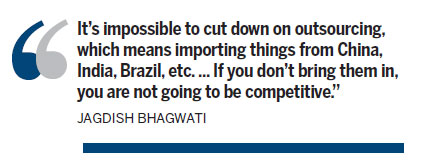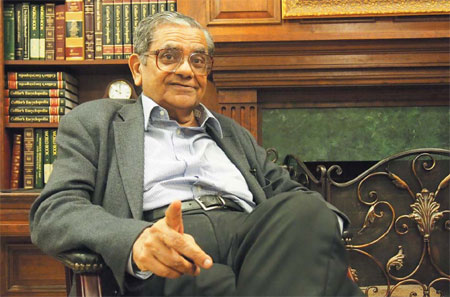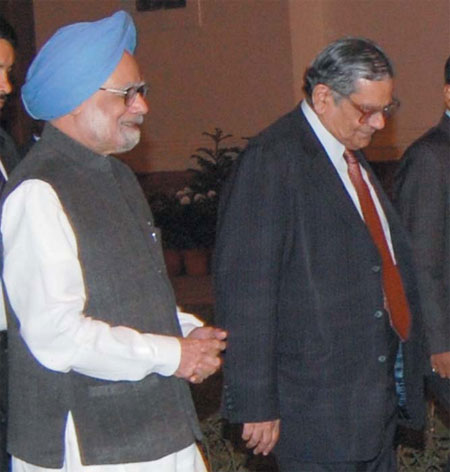Trade's champion
Updated: 2012-10-05 12:00
By Chen Weihua (China Daily)
|
||||||||
|
Jagdish Bhagwati, shown here in an interview in New York, has become known as much for his opinion essays in the media as he is for academic research. Chen Weihua / China Daily |
A renowned economist, who backs Beijing's policy stance and says outsourcing fears are overblown, talks with Chen Weihua of China Daily in New York.
Indian-American economist Jagdish Bhagwati would be the polar opposite of China if the country hadn't embraced market reforms and globalization over the past three decades.

Indeed, the stalwart advocate of free trade has been defending China in the face of campaign-trail sniping by President Barack Obama and Mitt Romney over the alleged Chinese role in the outsourcing of US jobs and Beijing's currency policy.
"The United States under the Obama administration has clearly shown that it's open to protectionism," Bhagwati told China Daily. "When they talk about outsourcing, they mean the US should use local production and not import things from outside. This is in violation of the spirit of WTO."
The 78-year-old economist spoke during an interview in a studio at the Council on Foreign Relations in New York, where he's a senior fellow in international economics.
Bhagwati believes this policy stance developed mainly due to pressure on Obama from Democrats in Congress who rely on labor unions' support.
But to Bhagwati, who himself is a registered Democrat, the blame for this falls on Bill Clinton. As president, Clinton paradoxically vanquished unions in enacting the North America Free Trade Agreement in 1993 but failed to convince them that trade is good for the United States, the economist said.
"It's impossible to cut down on outsourcing, which means importing things from China, India, Brazil, etc, simply because that is not what in today's world economy," he said. "There are so many imported components. For example, if you don't bring them in, you are not going to be competitive."
He pointed to a 2010 debate for a US Senate seat in California between incumbent Barbara Boxer and former Hewlett-Packard Co CEO Carly Fiorina. Bhagwati suggested that when accused by Boxer, a Democrat, of having outsourced 30,000 HP jobs to China and India, Republican Fiorina should have defended the move as necessary for the computer company to stay competitive or risk losing even more positions altogether.
Fiorina lost that election to Boxer.
As a Democrat, Bhagwati wasn't positioned to advise either Fiorina or Romney, but as a free-trade believer he thinks Republicans generally should defend their stands.
He would have free-trade candidates make the following argument to their campaign opponents: "Your analysis is wrong. You're going to hurt the system. If we stop importing from the world, other people, including the Chinese, will say we won't import from you. This is tit-for-tat. Both parties go down, instead of going up."
Bhagwati is disappointed that Obama has yet to make such an argument. "He is beginning to sound like Lou Dobbs," the professor said, referring to the Fox Business Network host known for his on-air rants against US companies that outsourced jobs, sometimes calling them "traitors".
On the other side, Bhagwati - author or editor of some 50 books - continues to write opinion essays extolling the benefits of trade. His witty, provocative columns appear in newspapers and magazines around the world.
In "The Outsourcing Bogeyman", a 2004 article in Foreign Affairs, he rebutted claims that outsourcing will be like a tsunami, flow only from rich countries to poor ones and only cost jobs, not create them.
|
Indian Prime Minister Manmohan Singh (left) and professor Jagdish Bhagwati, (as they walk to a meeting), studied economics together at Britain's Cambridge University in the 1950s. Provided to China Daily |
"It is simply not possible to outsource everything," wrote Bhagwati, a Columbia University professor since 1980 who previously taught at the Massachusetts Institute of Technology for 12 years after earning a PhD there. He cited the example of Texas-based computer maker Dell Inc curtailing use of call centers to fix customers' PC problems after Bhagwati told company founder Michael Dell of his experience not being able to understand technical instructions over the phone.
"There has been substantial growth in 'reverse outsourcing'. Indian firms like Infosys and Wipro, giants in the information-technology sector, are now looking for cutting-edge services and high-grade talent as they compete for local markets such as the US," Bhagwati's Foreign Affairs essay noted.
In an August 2010 commentary, he lashed out at Obama and other politicians for the "new fetish for manufacturing" and argued that "Made in America" isn't the way out of economic doldrums for the US. "Increasing demand for those non-tradable services that need suppliers and users to be close together - as, for example, with nursing and retirement homes - should have just the same effect on employment," he argued.
"By promoting manufacturing of all kinds (as can be expected as the sector's lobbies get down to work) at the expense of more innovative and dynamic service sectors, precisely when America is faltering in its recovery from the crisis, this unhelpful fascination promises to inflict gratuitous damage on an economy that can ill afford new wounds," Bhagwati wrote.
While such articles won't please Obama or other Democrats, the man who once said "professors should be a public nuisance" isn't about to rein in criticism on the subject that has defined his academic career.
In an FT piece from February headlined "Shame on you, Mr Obama, for pandering on trade", Bhagwati said the president had "infamously killed the multilateral Doha Round" of global trade negotiations in December 2011 "by instructing his representative at the [World Trade Organization] to be a 'rejectionist' negotiator".
With signatures from 50 of the world's most influential experts on trade, Bhagwati had written an open letter to Obama in August 2011, urging him to help bring long-delayed conclusion to the WTO's Doha Round after 10 years.
Obama "compounded the folly by instead floating the Trans-Pacific Partnership trade initiative that is conceived in a spirit of confronting China rather than promoting trade," he wrote.
Strategic concern
In a January blog post for the National Interest, a foreign-policy journal, Bhagwati said the Nafta-like regional trade pact "is being sold in the US to a compliant media and unsuspecting public as evidence of American leadership on trade. But the opposite is true." He added, "The TPP is a testament to the ability of US industrial lobbies, Congress and presidents to obfuscate public policy."
"Countries are, in principle, free to join the TPP. But a closer look reveals that China is not a part of this agenda. The TPP is also a political response to China's new aggressiveness, built therefore in a spirit of confrontation and containment, not of cooperation.
"It is no surprise that the TPP template includes numerous agendas unrelated to trade, such as labor standards and restraints on the use of capital-account control, many of which preclude China's accession," according to the blog entry. Bhagwati added that the putatively "high-quality" 21st-century trade agreement is actually "a rip-off by several domestic lobbies".
"China, India and Russia will never agree to those conditions; [the TPP] is dividing Asia," Bhagwati told China Daily. He has expressed his views publicly in Australia and said he will talk about the pact in Japan when he visits that country soon.
Australia is among nine countries negotiating terms of the TPP (along with Brunei, Chile, Malaysia, New Zealand, Peru, Singapore, Vietnam and the US), while Japan is considering participation. The next round of negotiations is set for December in Auckland, New Zealand.
In Bhagwati's view, the Obama administration has been preoccupied with strategic concerns over China. "They pretend that they are not trying to contain China," he said. "They are; it's obvious."
He lamented that Paul Krugman, the Nobel Prize-winning Princeton economist and New York Times columnist who was once Bhagwati's research assistant at MIT, has joined the ranks of China skeptics. Bhagwati has long endorsed the Chinese government's currency policy, arguing that US political leaders are misguided in focusing on the yuan-dollar exchange rate.
"The exchange rate is like the hand on my watch, the one that's not very important," he said. "What's important is the mechanism below that. If you look at China, it's already shifting. It does not want to hold all these [US] Treasury bills and get nothing from it."
China is moving toward increased spending on infrastructure, as his native India has begun to do. According to Bhagwati, China-bashing won't gain traction among scholars.
Beijing has been shrewd in learning to maneuver within the WTO, such as in cases of dumping allegations against China, said Bhagwati, who has advised the Geneva-based body as well as the Indian government and the United Nations.
"We all know that part of the system is terrible; they go back several decades. You have to work within the system, ask for the reform, build a coalition to counterweigh that," he said, adding that one of his former Columbia law students from China now serves on a WTO panel.
"If there is a lawsuit brought to the Chinese by the Americans, it is a good thing because it then goes to an impartial dispute-settlement panel, which the Americans cannot control. China can play a big role and it doesn't lose its cool."
Asked why Washington still encounters economic problems with so many talented economists in its midst, Bhagwati said that when you have six economists, you have six conclusions and six prescriptions.
"If (John Maynard) Keynes were one of the six, there would be seven opinions, because Keynes would have two," he said with a laugh.
The professor said that cynics sometimes attribute success in Southeast Asia to its paucity of economists, leaving rulers to make (better) decisions based on common sense. Admitting the bromide is anti-economist in nature, he finds some truth in it.
"Once you have a discipline, it's not easy to break out of it - it affects the way you think," Bhagwati said.
"That's why sometimes I can say things about microeconomics: It's not my field. You are not handicapped by the ways of looking at things you received. You bring a fresh approach."
Bhagwati's scholarly works and mainstream essays have touched on issues beyond trade and economics, including the environment, immigration and human rights.
He admired the late Chinese leader Deng Xiaoping, who launched reforms and China's opening-up in 1978. It was difficult to convince people in protectionist India of the validity of economic success stories in South Korea and Taiwan, which Indians tended to dismiss as being too small to matter.
"So when China came, it's bigger. Its outward integration can actually benefit. It doesn't mean everything should be dismantled. But you should not be afraid of international trade and foreign investment.
"That was a big breakthrough. That was very important to us," said Bhagwati, the 2000 winner of the Padma Vibhushan, India's second-highest civilian award. His wife, Padma Desai, a development economist, Russia specialist and also a professor at Columbia, won the prestigious Padma Bhushan award in 2009.
The couple were credited for their 1968 book, India Planning for Industrialization. Though intended as a blueprint for modernizing the Indian economy, its policy recommendations went largely unheeded until India undertook free-market reforms in the early 1990s.
Having studied with India's current prime minister, Manmohan Singh, at Cambridge University in the mid-1950s, Bhagwati said he isn't surprised that his old classmate has initiated major reforms, though they languished due to political pressures.
"We shared the same view," he explained. "I knew what he thought. We had to get rid of the framework of so many interventions. There was no international trade and no foreign investment" in the economy then.
Bhagwati said that even during their university days in Britain, he knew Singh, who also is a trained economist, "was going to go very far", but "I had no idea that he would become prime minister."
He told a story of how Singh, who was raised by his grandmother in humble surroundings, would get up at 4 am to take a cold shower when everyone else in their student house was shivering.
"Anyone who can survive the English winter and take a cold shower is bound to go very far," Bhagwati said.
Esteemed scholar
Besides being an adviser to Singh's government, Bhagwati in the 1960s worked for officialdom in New Delhi.
"For a young economist, those years also provided a heady interaction with the giants of the newly independent India - Prime Ministers [Jawaharlal] Nehru and Indira Gandhi, and polymath adviser to Nehru, PC Mahalanobis, who was also the architect of India's industrialization strategy," Indian economist Arvind Subramanian wrote in a 2005 profile of Bhagwati for the journal Finance and Development.
While Bhagwati has been honored with six Festschriften, a book honoring a respected person, and other awards, he hasn't received the Nobel Prize for Economics, which some say he deserves for his breakthrough work on trade and welfare.
Nobel laureate Krugman - who called himself an "SOB", or student of Bhagwati - praised his one-time mentor at a 2005 celebration.
"I think the thing about Jagdish is that he could have been someone who spent many years - the original work was so early that Jagdish could have spent 40 years defending his great work, work he had done 40 years ago. Instead he has kept on moving on, made the world a better place - made international economics a vastly better place that it would be.
"I shudder to think: It could have been the field that people told me not to get into, were it not for Jagdish. I really think that he made all the difference in the world," Krugman said.
At that same dinner for Bhagwati, former US Treasury secretary Larry Summers said: "Our world economic system has a long, long way to go toward being more just, more fair and more inclusive. But it is today fairer, juster and more inclusive than it would be without Jagdish Bhagwati's strenuous efforts."
But Bhagwati's reaction to such felicities is met with his characteristically wry humor.
"I joke that Mahatma Gandhi deserved [a Nobel prize] but did not get it either, so perhaps I will then be the second deserving Gujarati not to get it," he told India's Outlook magazine in 2004.
(China Daily 10/05/2012 page16)

 Relief reaches isolated village
Relief reaches isolated village
 Rainfall poses new threats to quake-hit region
Rainfall poses new threats to quake-hit region
 Funerals begin for Boston bombing victims
Funerals begin for Boston bombing victims
 Quake takeaway from China's Air Force
Quake takeaway from China's Air Force
 Obama celebrates young inventors at science fair
Obama celebrates young inventors at science fair
 Earth Day marked around the world
Earth Day marked around the world
 Volunteer team helping students find sense of normalcy
Volunteer team helping students find sense of normalcy
 Ethnic groups quick to join rescue efforts
Ethnic groups quick to join rescue efforts
Most Viewed
Editor's Picks

|

|

|

|

|

|
Today's Top News
Health new priority for quake zone
Xi meets US top military officer
Japan's boats driven out of Diaoyu
China mulls online shopping legislation
Bird flu death toll rises to 22
Putin appoints new ambassador to China
Japanese ships blocked from Diaoyu Islands
Inspired by Guan, more Chinese pick up golf
US Weekly

|

|








